As the puck is set to drop on the Colorado Avalanche’s season in just a week, the team blows into the season with a different set of divisional foes, but with the same intentions, winning their third Stanley Cup in franchise history. The goal has been the same since day one of the offseason following a heartbreaking overtime loss in game seven of the second round to the eventual Western Conference Champion Dallas Stars.
After three straight playoff appearances in the Jared Bednar era, the Avs know that this is the year for their now experienced team to take that next step in achieving hockey’s ultimate destiny. The expectations are certainly there as they are the odds-on-favorites to win it all. Whatever, the Avalanche’s fate this season, there will be some adversity in one way or another. Here is a look back at the two other Avalanche teams to win the Stanley Cup.
1995-96 Colorado Avalanche
Team Strengths
On every team that wins a Stanley Cup, there is that X factor who comes through when it matters most. On this Avalanche team that clutch player was future Hall of Famer Joe Sakic, who at the age of 26 was just making a name for himself around the league. Sakic had a nice supporting cast of stars like centerman Peter Forsberg, winger Valeri Kamensky, and Claude Lemieux, whom they had recently acquired that offseason after he was the Conn Smythe winner that previous season with the Stanley Cup Champion New Jersey Devils.
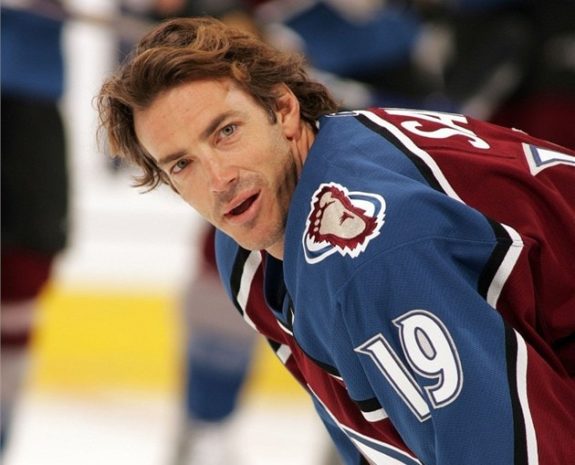
The team also made two other key offensive additions including defensemen from the San Jose Sharks Sandis Ozolins to help quarterback their power play as well as the legendary acquisition of Patrick Roy to play goal. Roy, one of the most loathed players by opposing team fans in the NHL started out slow in his transition but quickly became a big impact player making key stop after key stop to upset the top-seeded Detroit Red Wings in six games.
Adversities Overcome
The season before, the Avalanche were a different team entirely, playing in a different country. As the Quebec Nordiques, the previous season saw the ice melting in heartbreak for both the players and the fans. The top-seeded Nordiques had been upset by the eighth-seeded New York Rangers in six games in the opening round of the 1995 Stanley Cup Playoffs. Adding to the upset was the announcement following the 1995 season that the Nordiques ownership had no choice but to sell the team to a wealthy group of investors in Denver, CO for $103 million.
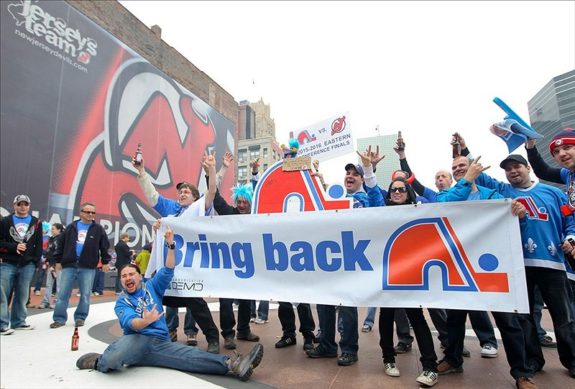
Thankfully, despite uncertainties from the players, the team adapted well to the Denver community, as they immediately got a splurge of fan support. As the newly formed Avalanche were breaking the ice in the rocky mountains, the team had a chip on their shoulder; to avenge last season’s disappointing playoff loss. That part would not come easy either.
The Avalanche nearly experienced another first-round knockout punch by the Vancouver Canucks as they were tied up in that series 2-2. This was where Sakic came through as that X factor separating him from the greats as a legend. In overtime of Game 5, Sakic was the hero scoring a hat trick goal to win it for the Avs and give them that crucial 3-2 lead which arguably marked the key tournament in the Avalanche overcoming playoff demons from a year ago.
Their ability to overcome a hard-hitting top-ranked Detroit Red Wings team in the Conference Finals and outlast the Florida Panthers in a triple-overtime bout in Game 4 of the Stanley Cup Finals ultimately led them to bring the city of Denver their first professional sports championship. In only their first year in the city, the Avs found themselves lifting sports’ biggest trophy, the Stanley Cup.
2000-01 Colorado Avalanche
Team Strengths
The team had an embarrassment of riches when it came to their areas of dominance. From earth-shattering records such as Roy becoming the winningest goaltender in NHL history for several years, to having five of the 12 starters in that year’s All-Star Game, dominance was in every aspect of the game. The team only grew that talent both in the offseason and regular season with a pair of acquisitions to put them over the top.
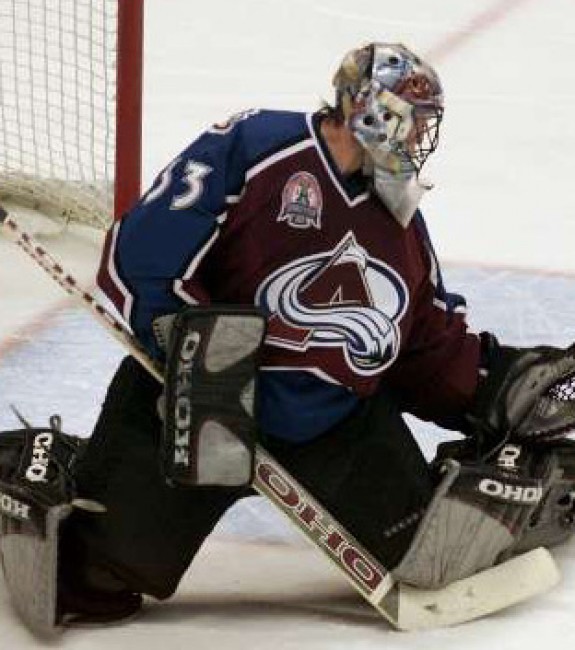
The acquisition of veteran defenseman Ray Bourque from the Boston Bruins the previous season, as well as the midseason acquisition of defenseman Rob Blake, only solidified their dominance on every level. They ranked in the top five in both goals for and goals against that season.
Adversities Overcome
Following their historic cup run in 1996, the Avalanche faced a series of tough playoff losses including back-to-back Game 7 Conference Final losses in Dallas. The team was poised to win it all again going into the 2000-2001 season. To do that the Avs knew they needed to clinch home-ice advantage throughout the playoffs. That they accomplished. However, their playoff run was anything but a cakewalk.
In the conference semifinals, the Avs nearly let a 3-1 series lead against the upstart Los Angeles Kings slip away as the series went to Game 7. When the Avs needed it most, however, all their pieces came together to deliver a commanding victory. Only they lost star centerman Forsberg to a nasty sprain, forcing other team members to step up. After making quick work of the St. Louis Blues in the Conference Final, the Avs faced an aggressive New Jersey Devils team.
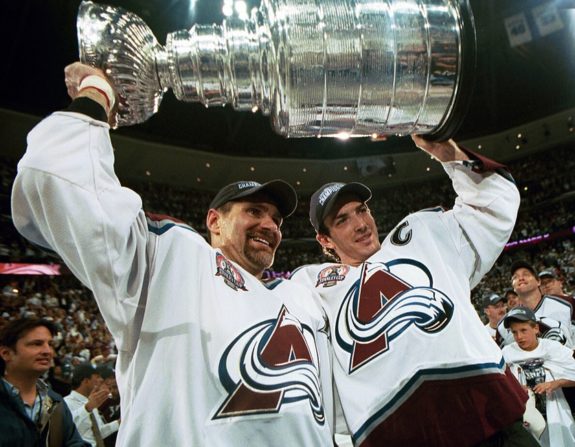
A major turning point in the series came from Bourque, who was yet to win a Stanley Cup in his Hall of Fame career. He came through with a major go-ahead goal in Game 3 to give the Avs a 2-1 series lead. However, the Avs were in their deepest hole yet going into game six as the Devils had a 3-2 series lead and now had the chance to clinch the series on their home ice in Game 6. Roy made a name for himself that night stopping every stone the Devils blasted at him. He led the Avs to a 4-0 shutout and forced a Game 7 as the team returned to Denver.
What started out as a classic back-and-forth affair in the first period, was capped off late in the second with a goal by none other than super Sakic, to put the Avs up 3-0. The story of the Avs’ Cup run this time around was not only the team’s remarkable bounce-back from past playoff defeats but how they helped cement the Hall of Fame legacy of Bourque.
How the 2020-21 Team Compares
Like the past two Avalanche championship clubs, this year’s team will be looking to avenge a disappointing loss from the previous season.
They are loaded with talent piloted by Sakic himself. Only this time Sakic is piloting the team from the general manager position. About a month ago the architect who built the other two Avalanche championship teams Pierre Lacroix passed away. As Sakic’s men look to follow in the memory by writing yet another championship script, they are certainly equipped with the pieces to do so.
This Avalanche team is built both for the future and to be perhaps the most dominant team in the present. The good news? They have arguably as much offensive depth as these other Avalanche championship teams and are led by Nathan Mackinnon, arguably the best in the game.
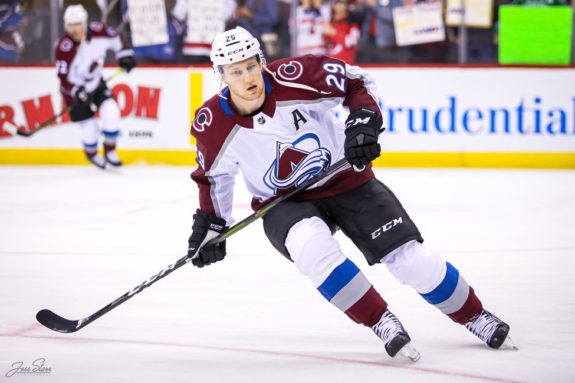
The bad news? There’s no Patrick Roy as the Avalanche are yet to have a stable reliable everyday netminder. But Philipp Grubauer or Pavel Francouz can always shock people, just look at some of the surprising goaltender performances these past playoffs. Also, the team did not make any offseason acquisitions nearly as big as the other two teams. But the acquisitions of defenseman Devon Toews and winger Brandon Saad might have been just the pieces the Avalanche were missing last season to go all the way.
Like the other two championship teams, this team will likely need to show resilience both by utilizing their depth when injuries occur, and getting a heroic performance from at least one player when they are buried in a hole.